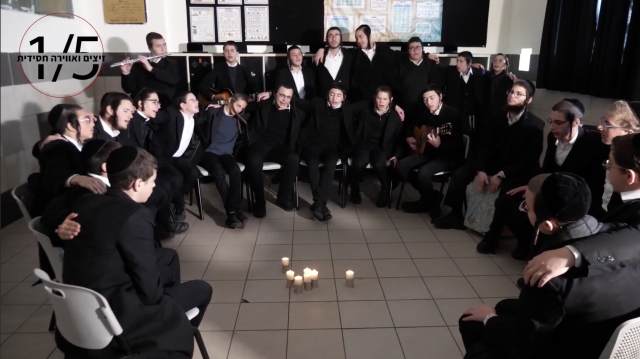As the topic of how the Ultra-Orthodox community in New York has taken nearly 1 billion dollars in government aid, but not applied it to improve the secular education of their yeshivas gains steam, the focus shifts to the Haredi community in Israel and how they are managing the balance between Torah and subjects that can help their students succeed in a modern world.
Historically, the Ultra-Orthodox have shunned secular learning. In New York, it is enraging taxpayers who see the failure of the yeshivas to provide a viable education to a generation that will almost surely, wind up on the public welfare rolls. In Israel, because of the political structure, it is less spoken about, but it is rapidly becoming a major problem for the nation as a whole.
One organization is hoping to help bridge the gap, and bring modern, secular studies into insulated communities. The “Netzach Education Network” for Ultra-Orthodox students, founded by Rabbi Menachem Bombach, considers modern subject studies an integral part of the school curriculum: "The ultra-Orthodox identity has great value and a contribution to Israeli society, as long as it is part of Israel."
The New York Times published a story Sunday analyzing New York’s Hasidic Jewish religious schools. The Times says the schools deny children a basic education.
— Spectrum News NY1 (@NY1) September 13, 2022
When asked about the exposé, Mayor Eric Adams and Gov. Kathy Hochul seemed unconcerned. https://t.co/Uj6Ozer7DX
Rabbi Menachem Bombach says: "I immigrated to Israel at the age of 20", and adds with a smile: "From Mea Shearim", an Ultra-Orthodox neighborhood in Jerusalem. Growing up, Bombach did not study Hebrew or any other subject that was not connected to the Jewish religion, and his decision to study general studies like math and science was for him an entry into a new world.
From a young age, Bombach was interested in education, but his lack of general knowledge stood as a great obstacle in his path. "The turning point for me," he says, "was when a 13-year-old immigrant from the former Soviet Union asked me if I could help him with his English homework. I couldn't help him, and he assumed that I was having difficulty in the subject because English is a difficult language. Then he asked me if I could help him with his math homework, but I couldn't help with that either."
העברת תקציבי עתק לבתי ספר שמסרבים ללמד אנגלית ומתמטיקה תיצור דור שלם של צעירים נטולי כישורי עבודה ופרנסה.
— Naftali Bennett בנט (@naftalibennett) September 12, 2022
זהו מהלך שמסכן את עתיד מדינת ישראל.
זה פשוט לא הוגן.
לא לצעירים החרדים שעסקנים גזרו עליהם בורות, ושייצאו לעולם לא מוכנים, נטולי יכולת לפרנס את עצמם ואת משפחתם. >> pic.twitter.com/PeMsAPyNSF
Bombach realized that if he wanted to be part of the world around him, he would need academic training. He graduated with a bachelor's degree in education from Abraham Heritage College and a master's degree in public policy from the Hebrew University. At the age of 25, he fulfilled his dream of working in the field of education, first as a boarding school instructor, and from there he advanced and became the head of the “Netzach education network”, which he founded in 2017.
Netzach combines religious studies with general subjects and educates ultra-Orthodox students to be observant Jews who are ready to live and work in Israeli society.
The foundation currently has ten schools and offers study programs for boys and girls in elementary and high schools in Jerusalem, Beit Shemesh, and Beitar.
“our eternal goal," explains Bombach, "is to raise a generation of God-fearing people who love the Torah, understand its importance, and will excel both in the Torah and in other studies. Netzach provides its students with a high-quality ultra-Orthodox education while preparing them to receive a matriculation certificate, thereby enabling them to integrate into the job market.”
Bombach notes that the educational network provides students with the necessary skills, and gives them the necessary tools to succeed in the 21st century, such as learning critical thinking, creativity, cooperation, and communication. The network includes 1,500 students in its schools and another 18,000 in its virtual school program "Eshkolot," which teaches general studies in an ultra-Orthodox manner.
Rabbi Menachem Bombach’s Netzach Educational Network for Haredi students views secular studies as integral part of its school curriculum https://t.co/lr3gjPN6LF
— Religion and State (@religion_state) September 11, 2022
Bombach bases his theory on polls showing that 10% of the ultra-Orthodox public in Israel consider themselves "modern ultra-Orthodox", and another 30% define themselves as "Orthodox with a modern outlook". The combined 40% between these two groups is his target audience. "Through them, we will be able to reach a critical mass and steer the way to a sustainable economic future for ultra-Orthodox families and the State of Israel," he emphasizes.
"Within two years we expect to serve between 1,800-2,300 students," he said.
"Any plan to add students requires the development of additional physical space, and many of the schools plan to expand with new buildings to adapt to the planned increase in students." It is important for Bombach to make it clear that he is not trying to harm the ultra-Orthodox lifestyle, but to instill in them a greater awareness of social responsibility to the outside world, which will be beneficial to the entire Jewish people. "I am not an agent of change, I'm an agent trying to preserve my community."


